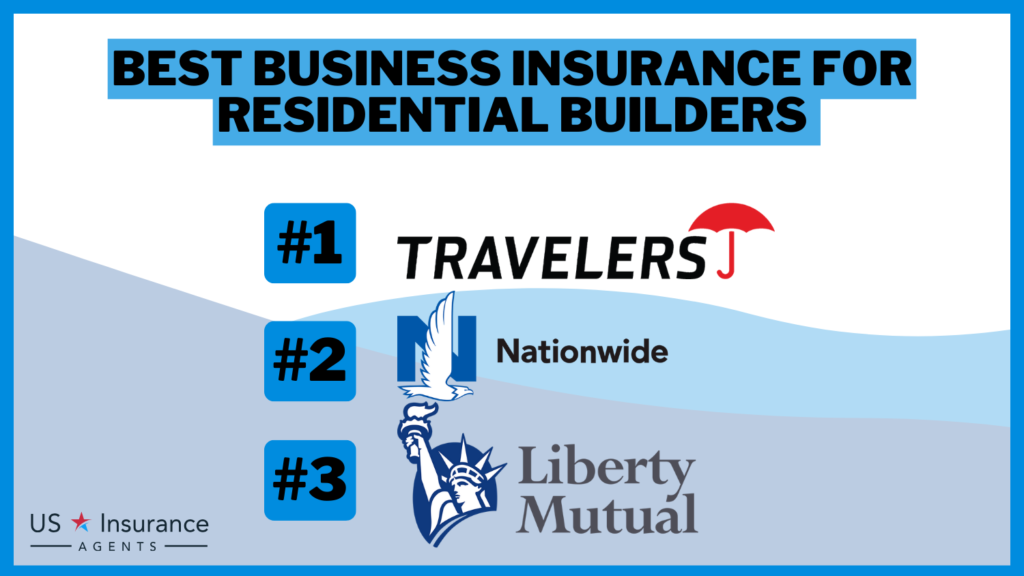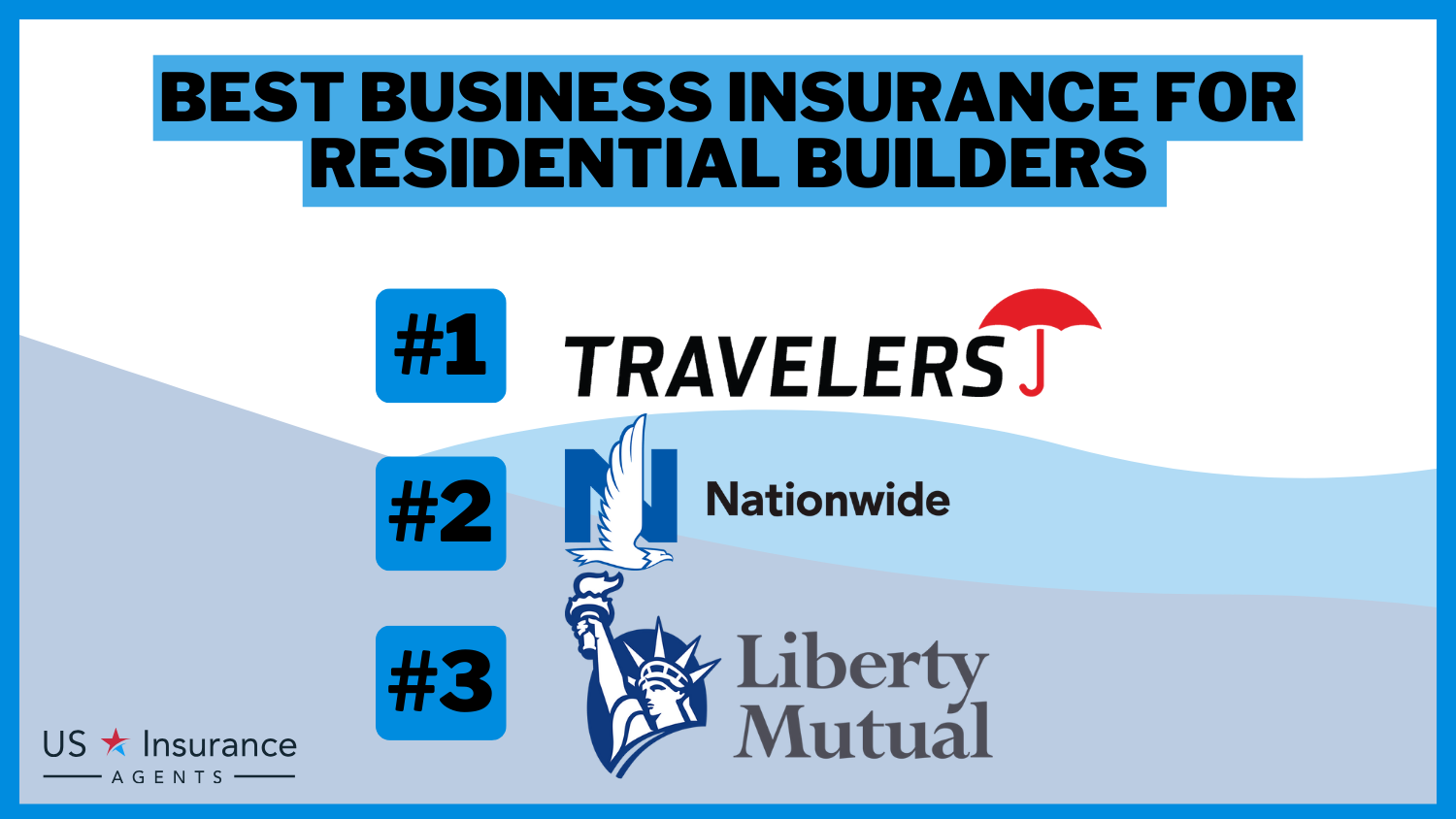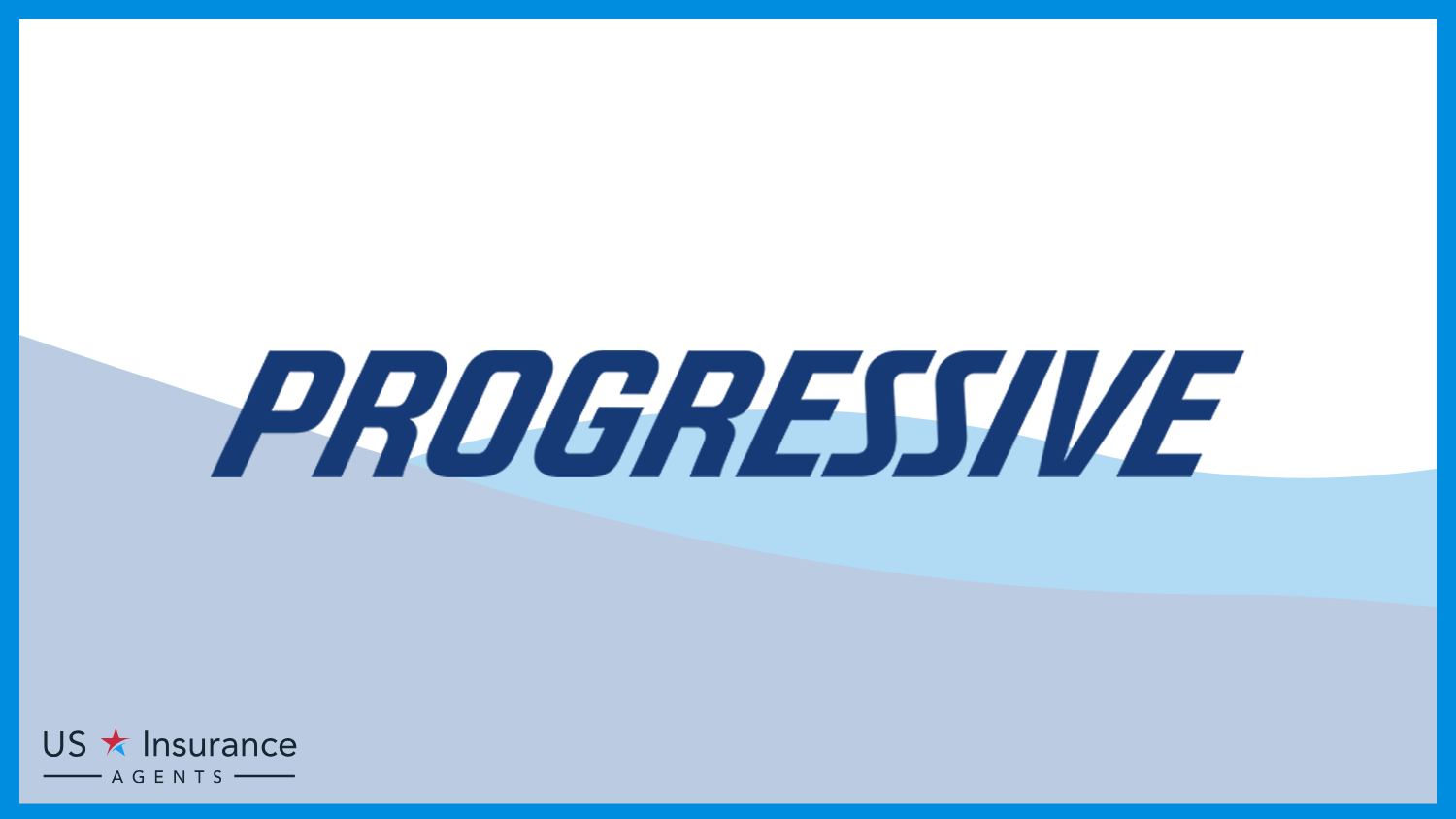Best Business Insurance for Residential Builders in 2026 (Top 10 Companies)
Travelers, Nationwide, and Liberty Mutual offer the best business insurance for residential builders, with rates as low as $160. Their policies are specifically designed to meet the unique needs of contractors in the residential building industry, ensuring comprehensive coverage and peace of mind.
Read more Secured with SHA-256 Encryption






Table of Contents
Table of Contents


Insurance and Finance Writer
Laura Gunn is a former teacher who uses her passion for writing and learning to help others make the best decisions regarding finance and insurance. After stepping away from the classroom, Laura used her skills to write across many different industries including insurance, finance, real estate, home improvement, and healthcare. Her experience in various industries has helped develop both her ...
Laura Gunn


Sr. Director of Content
Sara Routhier, Senior Director of Content, has professional experience as an educator, SEO specialist, and content marketer. She has over 10 years of experience in the insurance industry. As a researcher, data nerd, writer, and editor, she strives to curate educational, enlightening articles that provide you with the must-know facts and best-kept secrets within the overwhelming world of insurance....
Sara Routhier


Licensed Insurance Agent
Brad Larson has been in the insurance industry for over 16 years. He specializes in helping clients navigate the claims process, with a particular emphasis on coverage analysis. He received his bachelor’s degree from the University of Utah in Political Science. He also holds an Associate in Claims (AIC) and Associate in General Insurance (AINS) designations, as well as a Utah Property and Casual...
Brad Larson
Updated February 2025
 3,071 reviews
3,071 reviewsCompany Facts
Full Coverage for Residential Builders
A.M. Best
Complaint Level
Pros & Cons
 3,071 reviews
3,071 reviews 1,734 reviews
1,734 reviewsCompany Facts
Full Coverage for Residential Builders
A.M. Best Rating
Complaint Level
Pros & Cons
 1,734 reviews
1,734 reviews 3,792 reviews
3,792 reviewsCompany Facts
Full Coverage for Residential Builders
A.M. Best
Complaint Level
Pros & Cons
 3,792 reviews
3,792 reviewsThe best business insurance for residential builders are Travelers, Nationwide, and Liberty Mutual, offering comprehensive coverage tailored to the unique needs with rates starting at $160 for minimum coverage. These best insurance companies ensure robust protection against various risks and uncertainties inherent in residential construction projects.
From general liability to workers’ compensation and tools and equipment insurance, they provide a comprehensive suite of coverage options, safeguarding the future of contracting businesses.
Our Top 10 Company Picks: Best Business Insurance for Residential Builders
| Company | Rank | Universal Discount | Business Discount | Best For | Jump to Pros/Cons |
|---|---|---|---|---|---|
| #1 | 10% | 5% | Tailored Coverage | Travelers | |
 | #2 | 15% | 7% | Comprehensive Plans | Nationwide |
 | #3 | 12% | 8% | Contractor Expertise | Liberty Mutual |
| #4 | 10% | 6% | Customer Service | State Farm | |
| #5 | 8% | 4% | Cost Savings | Progressive | |
 | #6 | 10% | 5% | Risk Management | The Hartford |
| #7 | 15% | 7% | Technology Integration | Allstate | |
| #8 | 12% | 8% | High-Value Coverage | Chubb | |
| #9 | 10% | 6% | Specialized Policies | CNA | |
| #10 | 5% | 3% | Flexibility Options | Farmers |
Among them, Travelers stands out as the top pick, excelling in affordability, coverage options, and customer satisfaction, making it the preferred choice for residential builders seeking reliable insurance solutions.
Our free comparison tool makes it easy to stick to your business insurance budget – enter your ZIP code above to get started.
#1 – Travelers: Top Overall Pick
Pros
- Tailored Coverage: Travelers offers specialized coverage tailored to the unique needs of Residential Builders, ensuring comprehensive protection against various risks. Discover insights in our Travelers insurance review & ratings for further details.
- Low Complaint Level: With a low complaint level, Travelers demonstrates a commitment to customer satisfaction, providing a smooth and reliable insurance experience.
- A.M. Best Rating (A+): The A+ rating reflects Travelers’ financial strength and stability, instilling confidence in customers regarding the company’s ability to meet its obligations.
Cons
- Slightly Higher Monthly Rate: While offering tailored coverage, Travelers may come with a slightly higher average monthly rate, making it essential for builders to weigh the benefits against the cost.
- Limited Universal Discount: The 10% universal discount, though beneficial, may be considered relatively conservative compared to some competitors, impacting potential cost savings.
Free Business Insurance Comparison
Compare Quotes From Top Companies and Save
Secured with SHA-256 Encryption
#2 – Nationwide: Best for Comprehensive Plans
Pros
- Comprehensive Plans: Nationwide excels in offering comprehensive insurance plans for Residential Builders, ensuring a wide range of coverage options to meet diverse needs.
- Low Complaint Level: With a low complaint level, Nationwide emphasizes customer satisfaction, indicating a commitment to addressing customer concerns promptly and efficiently.
- A.M. Best Rating (A+): The A+ rating signifies Nationwide’s strong financial standing, assuring customers of its ability to fulfill financial obligations. Unlock details in the Nationwide insurance review & ratings to get additional insights.
Cons
- Moderately Higher Monthly Rate: Nationwide’s average monthly rate, while competitive, may be slightly higher, impacting the overall cost for builders.
- Limited Flexibility Options: Builders seeking more flexibility in policy options may find Nationwide’s offerings slightly restrictive compared to other providers.
#3 – Liberty Mutual: Best for Contractor Expertise
Pros
- Contractor Expertise: Liberty Mutual stands out with its contractor expertise, offering specialized knowledge that caters specifically to the needs and challenges faced by Residential Builders.
- A.M. Best Rating (A): With an A rating, Liberty Mutual maintains a solid financial position, instilling confidence in its ability to provide financial support when needed.
- Universal Discount: Liberty Mutual offers a 12% universal discount, providing builders with potential cost savings on their insurance premiums. Delve into the evaluation of Liberty Mutual review & ratings for a comprehensive overview.
Cons
- Slightly Higher Complaint Level: Liberty Mutual has a slightly higher complaint level, indicating a need for improvement in customer service and responsiveness.
- Moderately Higher Monthly Rate: The average monthly rate for Liberty Mutual is higher compared to some competitors, impacting the overall affordability for builders.
#4 – State Farm: Best for Customer Service
Pros
- Customer Service Excellence: State Farm is renowned for its exceptional customer service, offering builders a reliable and responsive support system for their insurance needs.
- Universal Discount: State Farm provides a 10% universal discount, contributing to potential cost savings for Residential Builders on their insurance premiums. Access comprehensive insights in the review of State Farm insurance review & ratings.
- Solid Financial Strength: With a robust financial position, State Farm instills confidence in its ability to fulfill financial obligations, assuring policyholders of stability.
Cons
- Limited Contractor Expertise: State Farm may not have as specialized contractor expertise as some competitors, potentially resulting in less tailored coverage for the construction industry.
- Moderately Higher Monthly Rate: While competitive, State Farm’s average monthly rate might be slightly higher compared to other providers, affecting overall affordability.
Free Business Insurance Comparison
Compare Quotes From Top Companies and Save
Secured with SHA-256 Encryption
#5 – Progressive: Best for Cost Savings
Pros
- Cost Savings: Progressive offers an 8% universal discount, providing Residential Builders with a potential reduction in insurance premiums and overall cost savings.
- Technologically Integrated Policies: Progressive stands out with technology integration, offering builders modern tools and systems for a more streamlined and efficient insurance experience.
- Flexible Policies: Progressive provides flexibility in policy options, allowing builders to tailor their coverage according to their specific needs and preferences. Discover more in our Progressive insurance review & ratings to gain more information.
Cons
- Moderate A.M. Best Rating (A): While still strong, Progressive’s A rating may be considered slightly lower than some competitors, impacting perceptions of financial stability.
- Limited Contractor-Specific Expertise: Progressive may not offer as specialized expertise for contractors, potentially leading to coverage gaps for the unique risks in the construction industry.
#6 – The Hartford: Best for Risk Management
Pros
- Risk Management Focus: The Hartford emphasizes risk management, offering Residential Builders comprehensive strategies to mitigate and address potential risks in their projects.
- Universal Discount: The Hartford provides a 10% universal discount, contributing to potential cost savings for builders looking to optimize their insurance expenses. Check out insurance savings in the comprehensive The Hartford insurance review & ratings.
- Tailored Coverage: With a focus on tailoring coverage to the needs of builders, The Hartford ensures that Residential Builders receive comprehensive protection against industry-specific risks.
Cons
- Slightly Higher Monthly Rate: While offering tailored coverage, The Hartford’s average monthly rate may be slightly higher compared to some competitors, impacting overall affordability.
- Limited Flexibility in Policy Options: Builders seeking a high degree of flexibility in policy options may find The Hartford’s offerings somewhat restrictive compared to other providers.
#7 – Allstate: Best for Technology Integration
Pros
- Technology Integration: Allstate stands out with technology integration, providing Residential Builders with modern tools and systems for a more streamlined and efficient insurance experience.
- Universal Discount: Allstate offers a generous 15% universal discount, contributing significantly to potential cost savings for builders on their insurance premiums.
- Comprehensive Plans: Allstate excels in offering comprehensive insurance plans for Residential Builders, ensuring a wide range of coverage options to meet diverse needs. Read up on our Allstate insurance review & ratings for in-depth analysis.
Cons
- Moderately Higher Complaint Level: Allstate has a slightly higher complaint level, indicating a potential need for improvement in customer service and responsiveness.
- Limited Contractor-Specific Expertise: Allstate may not provide as specialized expertise for contractors, potentially leading to coverage gaps for the unique risks in the construction industry.
Free Business Insurance Comparison
Compare Quotes From Top Companies and Save
Secured with SHA-256 Encryption
#8 – Chubb: Best for High-Value Coverage
Pros
- High-Value Coverage: Chubb is known for providing high-value coverage, ensuring that Residential Builders have robust protection for their valuable assets and projects.
- Universal Discount: Chubb offers a 12% universal discount, contributing to potential cost savings for builders looking to optimize their insurance expenses. More information is available about this provider in our Chubb insurance review & ratings.
- Specialized Policies: Chubb provides specialized policies, tailoring coverage to the unique needs of Residential Builders and offering solutions for the specific risks they face.
Cons
- Higher Monthly Rate: Chubb’s average monthly rate may be higher compared to some competitors, impacting the overall affordability for Residential Builders.
- Limited Flexibility in Policy Options: Builders seeking a high degree of flexibility in policy options may find Chubb’s offerings somewhat restrictive compared to other providers.
#9 – CNA: Best for Specialized Policies
Pros
- Specialized Policies: CNA stands out by offering specialized policies, tailoring coverage to the unique needs and risks faced by Residential Builders in the construction industry.
- Universal Discount: CNA provides a 10% universal discount, contributing to potential cost savings for builders on their insurance premiums. See details in our CNA insurance review & ratings for a thorough examination.
- Solid Financial Strength: With a solid financial position, CNA instills confidence in its ability to fulfill financial obligations, assuring policyholders of stability.
Cons
- Moderately Higher Monthly Rate: While competitive, CNA’s average monthly rate may be slightly higher compared to other providers, impacting overall affordability.
- Limited Technology Integration: CNA may have limited technology integration compared to some competitors, potentially affecting the efficiency and modernity of the insurance experience.
#10 – Farmers: Best for Flexibility Options
Pros
- Flexibility Options: Farmers insurance review & ratings highlights its flexibility options, allowing Residential Builders to choose coverage that suits their specific needs and preferences.
- Solid Financial Strength: With a solid financial position, Farmers instills confidence in its ability to fulfill financial obligations, assuring policyholders of stability.
- Customer Service Excellence: Farmers is recognized for its exceptional customer service, offering builders a reliable and responsive support system for their insurance needs.
Cons
- Limited Universal Discount: While offering flexibility, Farmers provides a relatively lower universal discount, impacting potential cost savings for builders on their insurance premiums.
- Slightly Higher Monthly Rate: Farmers’ average monthly rate may be slightly higher compared to some competitors, making it essential for builders to weigh the benefits against the cost.
Free Business Insurance Comparison
Compare Quotes From Top Companies and Save
Secured with SHA-256 Encryption
The Vital Importance of Insurance for Residential Builders
Residential construction projects are inherently risky endeavors, fraught with uncertainties and potential financial pitfalls. Despite contractors’ best efforts, unforeseen incidents like accidents, injuries, and property damage can occur, posing significant threats to their businesses.
In this landscape, residential builder’s insurance emerges as an indispensable asset, offering a protective shield against the myriad perils of the industry. It serves not only to manage risks effectively but also to ensure legal compliance, instill client confidence, and provide essential financial protection.
Jeff Root Licensed Life Insurance Agent
With the construction sector’s inherent hazards and regulatory requirements, a comprehensive coverage policy isn’t just a prudent choice but an essential lifeline for the survival and growth of any contracting business.
The Components of Residential Builders Insurance
Residential builder’s insurance comprises several critical components tailored to mitigate risks inherent in construction projects. These components include:
- General Liability Insurance: This foundational coverage protects against property damage or injuries caused by you or your team during projects. It covers expenses like property repair or medical bills for injured parties and includes legal defense costs if lawsuits arise.
- Professional Liability Insurance: Also known as contractor’s errors and omissions insurance, this safeguards against claims of negligence or failure to fulfill professional duties. It covers legal fees and damages arising from alleged errors in construction or service delivery.
- Workers’ Compensation Insurance: Crucial for businesses with employees or subcontractors such as electricians, plumbers, or carpenters, this coverage provides financial support for medical expenses and lost wages in case of work-related injuries or illnesses. It’s often a legal requirement and promotes a supportive work environment.
- Commercial Auto Insurance: Commercial auto insurance is essential for vehicles used in business operations, this coverage extends beyond personal auto insurance to protect against accidents, liabilities, and damages while driving for work purposes.
- Tools and Equipment Insurance: Specifically designed for construction tools and equipment, this coverage protects against on-site damage, theft, and loss during transit or storage.
These components are customizable to suit your business’s unique needs, ensuring comprehensive protection against potential liabilities and financial losses. Always review policy details carefully to understand coverage specifics and ensure adequate protection for your residential building endeavors.
Cost of Business Insurance for Residential Builders
The cost varies depending on the level of coverage desired, with minimum coverage being cheaper than full coverage across the board. Looking at the table, it’s clear that the cost of business insurance for residential builders varies depending on the level of coverage and the provider. Nationwide offers the lowest rates for both minimum and full coverage, while Progressive offers the highest rates.
Business Insurance for Residential Builders: Monthly Rates by Coverage Level & Provider
| Insurance Company | Minimum Coverage | Full Coverage |
|---|---|---|
| $175 | $295 | |
| $180 | $300 | |
| $185 | $305 | |
| $170 | $290 | |
 | $165 | $285 |
 | $160 | $280 |
| $190 | $310 | |
| $170 | $290 | |
 | $180 | $300 |
| $185 | $305 |
There isn’t a significant difference in rates between providers, with only a narrow range between the lowest and highest rates for both minimum and full coverage. This suggests that residential builders can expect comparable rates across different providers, with factors such as reputation and coverage details possibly influencing their choice more than price alone.
Free Business Insurance Comparison
Compare Quotes From Top Companies and Save
Secured with SHA-256 Encryption
Obtaining Online Quote for Residential Builders
In today’s digital era, accessing insurance quotes for residential builders has become simpler and more convenient than ever before. Here’s a step-by-step guide on how to navigate the process effectively:
- Research and identify reputable platforms. Begin by researching reputable online insurance platforms that specialize in providing coverage for residential builders. Look for platforms with a user-friendly interface, positive reviews, and a track record of reliability.
- Visit the platform’s website. Once you’ve identified a suitable platform, visit their website to initiate the quote process. Most platforms will have a dedicated section or homepage feature for obtaining quotes.
- Enter relevant information. Provide the required information about your residential building business. This may include details such as the nature of your projects, the size of your workforce, past claims history, and desired coverage limits.
- Specify coverage needs. Clearly outline your coverage needs and preferences. Specify the types of coverage you require, such as general liability, workers’ compensation, property insurance, and any additional endorsements or specialized policies.
- Customize policy parameters. Many online platforms allow for customization of policy parameters to align with your specific business requirements. Adjust coverage limits, deductibles, and policy features to tailor the quote to your preferences.
- Review and confirm details. Before proceeding, carefully review all the information you’ve provided to ensure accuracy. Pay close attention to details such as coverage options, policy terms, and pricing estimates.
- Submit request for quotes. Once you’re satisfied with the information entered, submit your request for insurance quotes online. This action triggers the platform’s algorithms to generate personalized quotes from various insurance providers.
- Compare quotes. Upon receiving quotes from multiple insurers, take the time to compare them thoroughly. Evaluate factors such as coverage breadth, pricing, deductible amounts, policy features, and insurer reputation.
- Seek clarification if needed. If you encounter any terms or details that are unclear, don’t hesitate to reach out to the platform’s customer support team for clarification. They can provide guidance and assistance throughout the quoting process.
- Select the best option. After careful consideration, select the insurance quote that best meets your business’s needs and budget. Keep in mind that the cheapest option may not always provide the most comprehensive coverage, so weigh your priorities accordingly.
- Finalize the policy. Once you’ve chosen a quote, follow the platform’s instructions to finalize the policy purchase. This typically involves completing any remaining paperwork, submitting payment information, and signing relevant documents electronically.
- Review policy documents. After purchasing the policy, carefully review all policy documents and endorsements provided by the insurer. Ensure that you understand the terms, conditions, and coverage limitations outlined in the contract.
- Maintain ongoing communication. Stay in touch with your insurer and the online platform for any updates, changes, or renewal reminders. Maintaining open communication ensures that your coverage remains up-to-date and responsive to your evolving business needs.
By following these steps, residential builders can navigate the process of obtaining online insurance quotes with confidence and efficiency, ultimately securing comprehensive coverage that safeguards their business interests.
In leveraging these advantages, builders can navigate the insurance landscape with confidence, securing comprehensive coverage tailored to their specific needs.
Case Studies: Unveiling Success Stories of Residential Builders Insurance
These case studies highlight the critical role that various types of insurance play in protecting residential builders from potential financial losses and liabilities. Here’s a summary of each case study:
- Case Study #1 – General Liability Insurance: A residential builder accidentally damages a high-end refrigerator during a kitchen remodel. General liability insurance covers the cost of replacing the damaged appliance, preventing a financial burden on the contractor.
- Case Study #2 – Professional Liability Insurance: A home extension project runs over schedule, causing the homeowner additional costs. Professional liability insurance covers the expenses and legal fees from the resulting claim, safeguarding the contractor’s business.
- Case Study #3 – Workers’ Compensation Insurance: A carpenter suffers a serious injury while working on a renovation project. Workers’ compensation insurance covers medical expenses and lost wages, protecting both the employee and the contractor from financial strain. For further information, refer to the relevant article in the detailed resource “Best Business Insurance for Carpenters“.
- Case Study #4 – Commercial Auto Insurance: A company vehicle transporting tools and materials to a job site is in an accident, damaging the vehicle and equipment. Commercial auto insurance covers repair costs, ensuring the contractor can resume operations swiftly.
- Case Study #5 – Tools and Equipment Insurance: Thieves steal expensive tools from a builder’s on-site storage container. Tools and equipment insurance covers the cost of replacement, enabling the contractor to continue work without a significant financial setback.
This illustrate the invaluable protection that various types of insurance provide to residential builders. From covering damages to property and injuries to workers, to safeguarding against professional negligence and theft, insurance plays a pivotal role in ensuring the financial stability and continuity of construction businesses.
Melanie Musson Published Insurance Expert
By understanding the risks involved in their operations and securing appropriate insurance coverage, builders can mitigate potential liabilities and focus on delivering high-quality projects with confidence and peace of mind.
The Bottom Line: Securing the Future of Residential Builders
Residential builder’s insurance is a vital consideration for any construction business. It provides a safety net for a multitude of situations that could result in significant financial losses.
The key components, namely general liability insurance, professional liability insurance, workers’ compensation insurance, commercial auto insurance, and tools and equipment insurance, each play a critical role in protecting different facets of your business.
Laura Walker Former Licensed Agent
Case studies illustrate how these types of insurance can come into play in real-life scenarios, reinforcing the importance of having a comprehensive insurance policy. Always remember, it’s not just about meeting regulatory requirements; it’s about securing the future of your business and providing peace of mind for both you and your clients. (Read more: How to Get Free Insurance Quotes Online).
To find cheap business insurance, enter your ZIP code into our free quote comparison tool below and get covered today.

Frequently Asked Questions
What are the key components of residential builders’ insurance?
The key components of residential builder’s insurance include General Liability Insurance, Professional Liability Insurance, Workers’ compensation Insurance, Commercial Auto Insurance, and Tools and Equipment Insurance. Each of these components plays a crucial role in protecting different facets of the business.
Why is residential builder’s insurance essential for contractors?
Residential builder’s insurance is indispensable for contractors because it serves as a protective shield, offering a safety net against unforeseen incidents and potential financial losses. It is not only a legal requirement but a practical necessity for the survival and growth of the contracting business.
Ready to find the best fleet insurance? Enter your ZIP code in our comparison tool below to see affordable commercial insurance rates in your area.
What does professional liability insurance cover for residential builders?
Professional liability insurance, also known as contractor’s errors and omissions (E&O) insurance, offers protection against claims of negligence or failure to perform professional duties. It can cover costs and legal fees associated with claims, safeguarding the contractor’s business against client dissatisfaction or legal disputes.
What is commercial auto insurance, and why do residential builders need it?
Commercial auto insurance covers vehicles used for business operations, including transportation of materials and traveling to job sites. It ensures coverage for accidents that may occur during business-related driving activities.
Why is general liability insurance important for residential builders?
General liability insurance is vital for residential builders as it provides coverage for costs related to property damage or injuries inflicted by the contractor or their employees during a project. It is often a legal requirement for obtaining a general contractor license and can also be a business enabler, satisfying client demands for proof of insurance.
Why is comprehensive coverage important for residential builders?
Comprehensive coverage ensures protection against various risks inherent in residential construction projects, providing peace of mind and financial security for the business.
Why is workers’ compensation insurance important for residential builders?
Workers’ compensation insurance is vital for residential builders as it provides financial assistance for medical payments including how a medical discount plan can effectively lower your healthcare expenses, and treatments if employees, including subcontractors, get injured while working on a project.
What does tools and equipment insurance cover for residential builders?
Tools and equipment insurance protects vital items used in the business against loss or damage, ensuring continuity of operations. Coverage typically includes theft, damage, and loss during transit or storage.
How can residential builders find the best insurance coverage for their needs?
Residential builders can compare quotes from top insurance companies using free online tools, considering factors such as coverage options, rates, customer satisfaction, and industry expertise.
What are the benefits of having comprehensive insurance coverage for residential builders?
Comprehensive coverage mitigates financial risks associated with property damage, injuries, legal disputes, and other unforeseen incidents, enabling contractors to focus on delivering high-quality projects with confidence.
Get commercial insurance that doesn’t break your budget by using our free comparison tool below.
Get a FREE Quote in Minutes
Insurance rates change constantly — we help you stay ahead by making it easy to compare top options and save.















